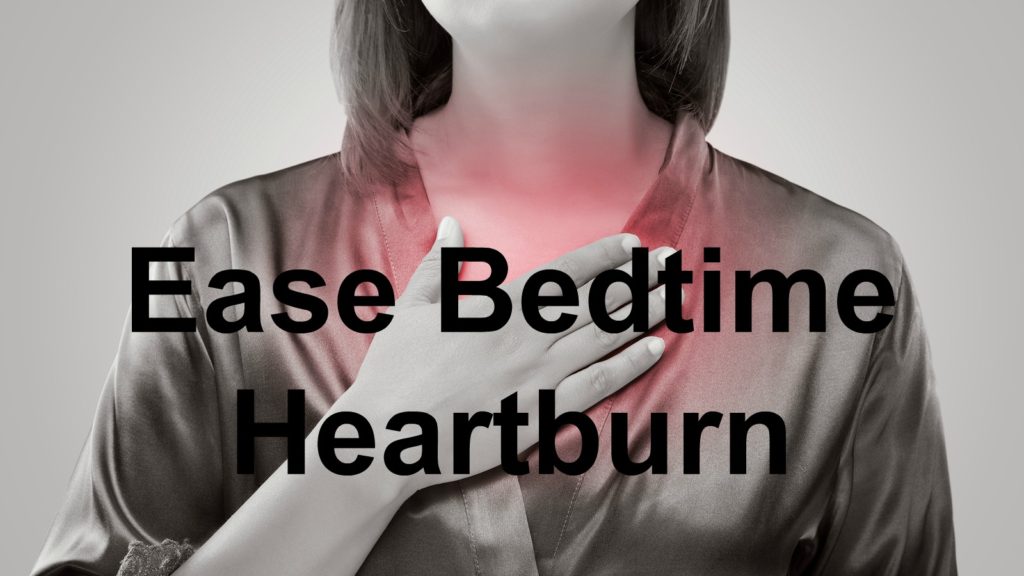Heartburn occurs when stomach acid flows back into your esophagus, causing an uncomfortable burning feeling in your chest that can move up to your neck and throat. It may also cause you to have a bitter or sour taste in the back of your throat. It can last from a few minutes to several hours.

According to WebMD, millions of people experience heartburn daily. Research shows that nighttime heartburn affects four out of five heartburn sufferers, which disturbs their sleep and impairs their ability to function the following day. A National Sleep Foundation poll found that adults who have bedtime heartburn are more likely to have sleep issues such as insomnia, daytime sleepiness, and restless leg syndrome.
Some symptoms of nighttime heartburn include waking with:
- A bitter taste in the mouth
- A chronic cough
- A sore throat
- Fatigue
Chances are if you’re experiencing these symptoms of nighttime heartburn every morning, you want relief. The good news is that it is possible to manage the discomfort brought on by nighttime heartburn, and get a better night’s rest when you utilize the following tips.
Watch What, and When, You Eat
Avoiding fatty or fried foods at dinner, as well as limiting acidic foods (grapefruit, oranges, tomatoes, or vinegar) and spicy foods (pepper and chilies), is the best way to prevent bedtime heartburn. You should also avoid caffeinated and carbonated drinks at dinnertime as well as alcohol and nicotine. Taking your time when you eat- not scarfing your food down as fast as you can- will help prevent heartburn. It is also a good idea to have your last meal of the day be at least three hours before you go to bed. When you lie down too soon after a meal, it can trigger the acid from your stomach to rise, resulting in painful heartburn. You can also try chewing gum at night to boost your production of saliva, which can neutralize stomach acid.
Change Your Sleep Position
It may seem odd, but what side you sleep on can affect your heartburn. When you sleep on your right side, heartburn symptoms can flare. However, when you sleep on your left side, you take pressure off your esophageal sphincter, allowing your body to digest easier and remove acid from your esophagus and stomach more quickly. Having your upper body elevated when you sleep can also help prevent heartburn. Raise the head of your bed or use a foam wedge to keep your body propped slightly upright from your waist up. Do not rely on piles of pillows for this as they can cause you to put more pressure on your stomach which would make your heartburn worse.
Keep Clothing Loose
Before bed, avoid tight belts, waistbands, and pantyhose that can press on your stomach, triggering heartburn. Don’t wear pajamas that are tight or restrictive to bed. Keeping pressure off your stomach and lower esophageal sphincter while you sleep will help limit or prevent heartburn when you are trying to get a good night’s sleep.
Try Antacids
A good antacid tablet (Tums), or H-2-receptor blocker (Pepcid AC), can be helpful in treating occasional heartburn. However, if these aren’t doing the trick, or you find yourself consistently relying on them, you should talk to your doctor. You may need to be tested for gastroesophageal reflux disease (GERD), which is a severe form of reflex that needs to be treated with prescription medication or possibly surgery.
Maintain a Healthy Weight
Extra weight can increase pressure on your stomach, increasing the chances that stomach acid will back-up into your esophagus. Discuss a healthy goal weight with your doctor, and try and maintain it to not only prevent heartburn but other health problems associated with being overweight.
We hope you can enjoy peaceful sleep once you have tried our tips for preventing heartburn. However, if you are not finding any relief, it is best to see your doctor to rule out any potential health issues.
Since 2002, Valley Sleep Center has been providing diagnostic testing for a multitude of sleep-related disorders including insomnia, sleep apnea, snoring, excessive daytime sleepiness, hypertension, sleepwalking, and pediatric sleep problems. Our physicians are Board Certified Sleep Medicine Specialists and are accredited by the American Academy of Sleep Medicine. For more information, go to www.valleysleepcenter.com.

